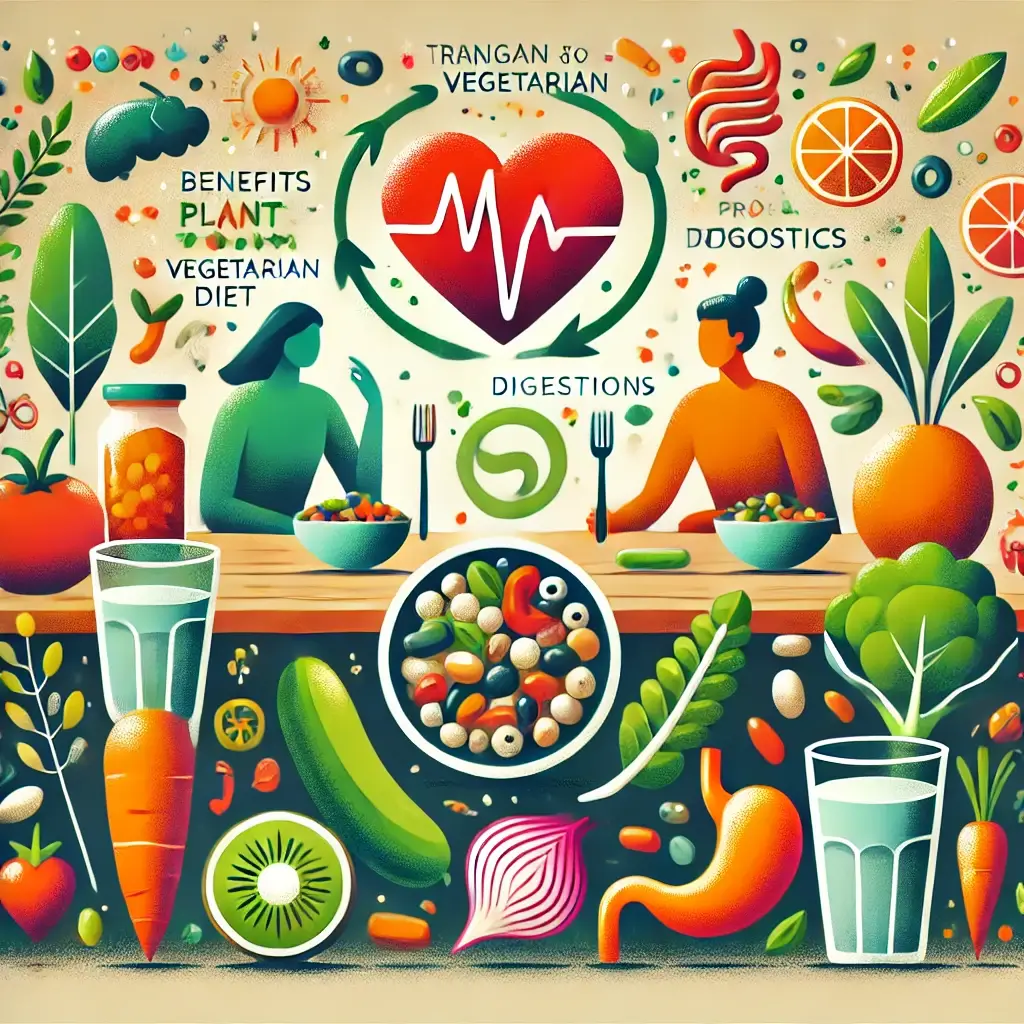Understanding the Benefits and Challenges of Plant-Based Diets
Embracing a vegan or vegetarian lifestyle is a choice many make for its numerous health benefits, ethical considerations, or environmental impact. Such diets are often rich in nutrients, antioxidants, and fibers, offering potential improvements in heart health and weight management, and a reduced risk of chronic diseases. However, the journey isn’t always smooth, especially when it comes to digestion.
Adapting to Dietary Changes
A sudden shift from a traditional diet to a plant-based one can introduce significant changes in the digestive system. Increased fiber intake, the introduction of unfamiliar plant-based proteins, and the presence of certain carbohydrates like FODMAPs in vegetables can challenge the gut, leading to bloating, gas, or other discomforts. While these changes might be frustrating, they are often temporary and manageable.
Navigating the Transition to Plant-Based Living
This article aims to unpack the common digestive challenges encountered on a plant-based diet and provide practical, research-backed strategies to overcome them. With mindful eating habits and evidence-based solutions, transitioning to a vegan or vegetarian diet can be a rewarding experience for both your body and the planet.
Understanding Fiber’s Role in Digestion
Plant-based diets are synonymous with high fiber, which is essential for gut health and regular bowel movements, and reduced cholesterol levels. However, a sudden spike in fiber can overwhelm the digestive system, causing bloating, gas, and even constipation. A study published in Nutrients (2020) highlights that the gut microbiota requires time to adapt to increased fiber intake, a process that varies between individuals (Smith et al., 2020).
Practical Solutions for Fiber Adaptation
Solutions:
• Gradual Introduction: Slowly incorporate high-fiber foods into your diet, such as legumes, whole grains, and vegetables.
• Hydration: Ensure adequate water intake, as fiber absorbs water to aid digestion.
• Cooking Methods: Cooking fibrous vegetables and legumes can make them easier to digest.
• Probiotic Support: Probiotics such as Lactobacillus can help modulate gut bacteria and reduce symptoms.
Managing FODMAPs and Food Sensitivities
FODMAPs—fermentable oligosaccharides, disaccharides, monosaccharides, and polyols—are naturally present in many plant-based foods like beans, onions, and certain fruits. These carbohydrates can be poorly absorbed in the small intestine, leading to fermentation by gut bacteria and subsequent bloating or gas. Research in Gastroenterology (2021) found that adopting a low-FODMAP diet significantly alleviates symptoms in individuals with irritable bowel syndrome (IBS) (Johnson et al., 2021).
FODMAP Management Strategies
Solutions:
• Low-FODMAP Choices: Opt for lower-FODMAP vegetables like zucchini, carrots, and spinach initially.
• Food Journaling: Track meals to identify specific trigger foods.
• Gradual Reintroduction: Reintroduce high-FODMAP foods one at a time to gauge tolerance levels.
Optimizing Plant Protein Digestion
Legumes, a staple protein source in vegan diets, are known for causing gas and bloating due to their high fiber and oligosaccharide content. However, preparation techniques and supplements can mitigate these effects.
Research-Based Solutions for Protein Digestion
Research Insight: A study in The Journal of Food Science (2018) demonstrated that soaking and sprouting legumes reduce their antinutrient content, improving digestibility (Miller et al., 2018).
Solutions:
• Preparation Techniques: Soak beans overnight and rinse them thoroughly before cooking.
• Enzyme Supplements: Use supplements containing alpha-galactosidase to break down complex sugars.
• Variety: Incorporate alternative protein sources like tofu, tempeh, and seitan.
Understanding Gut Microbiome Adaptation
The gut microbiome plays a crucial role in digesting plant-based diets. Initial bloating is common as gut bacteria adjust to new foods. Studies suggest that probiotics and prebiotics can support gut adaptation and enhance digestive comfort (American Journal of Gastroenterology, 2019).
Supporting Your Microbiome
Solutions:
• Probiotic-Rich Foods: Incorporate fermented foods like kimchi, sauerkraut, and miso.
• Prebiotic Fibers: Include foods like bananas and asparagus to nourish gut bacteria.
• Consistency: Allow time for your gut to adapt to new dietary patterns.
Making a Successful Transition
Transitioning to a vegan or vegetarian diet offers immense benefits, but it may challenge your digestive system during the initial phases. Understanding the underlying causes of discomfort—such as increased fiber, FODMAPs, and plant protein digestion—is key to overcoming these hurdles. With gradual adjustments and proper food preparation techniques, digestive issues can be minimized, allowing you to thrive on a plant-based lifestyle.
Professional Guidance and Support
As always, if digestive discomfort persists, consult a healthcare professional to explore potential underlying conditions or receive tailored dietary advice. With patience and informed choices, a vegan or vegetarian diet can become a sustainable and health-promoting way of life.
Scientific References
References
Smith, J. et al. (2020). “Fiber Intake and Gut Microbiota Adaptation.” Nutrients. Link
Johnson, A. et al. (2021). “Efficacy of Low-FODMAP Diets in IBS.” Gastroenterology. Link
Miller, R. & Green, T. (2018). “Sprouting Legumes for Improved Digestibility.” Journal of Food Science. Link
